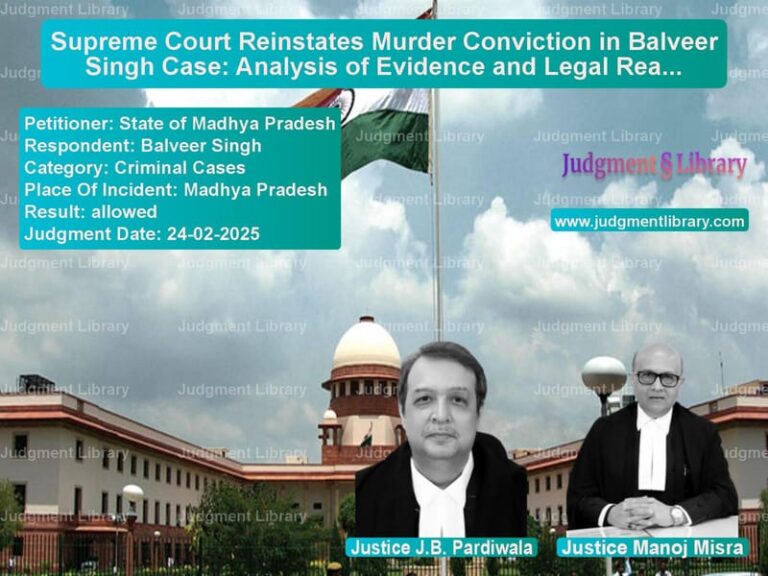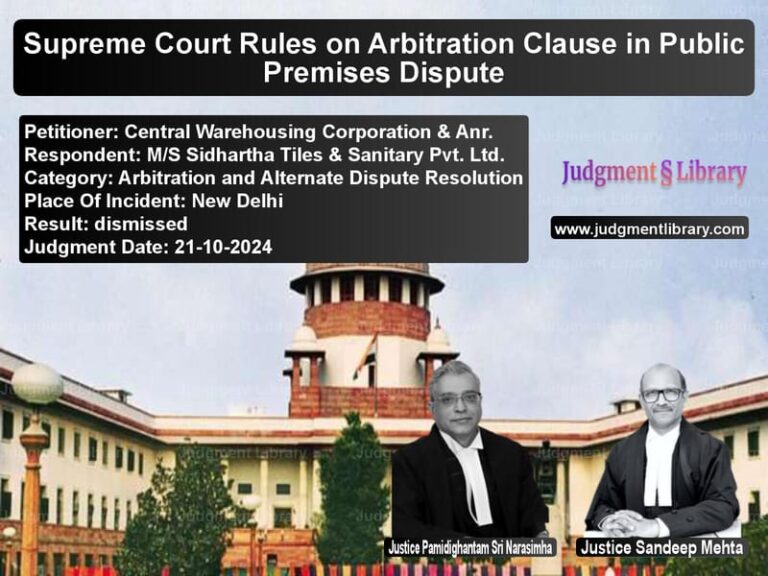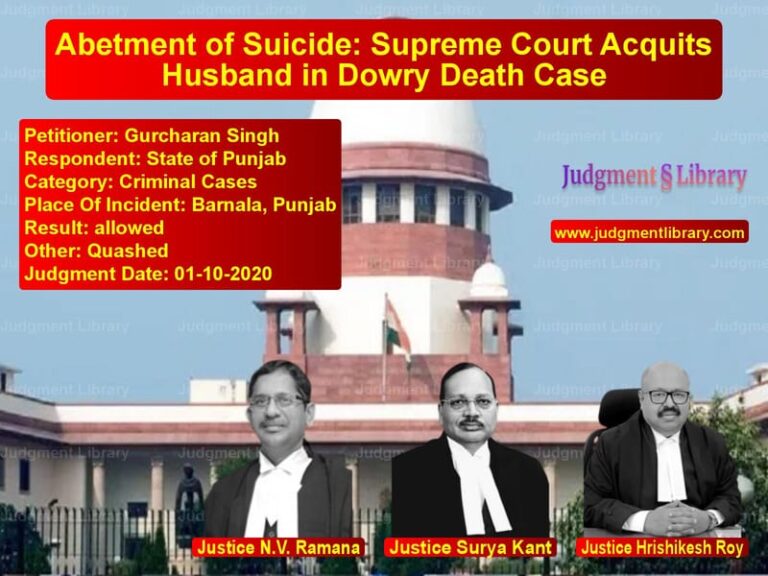Dispute Over Compensation in Land Acquisition: Patel Kodarbhai Mohanbhai v. Sonata Ceramica Pvt. Ltd.
The case of Patel Kodarbhai Mohanbhai v. Sonata Ceramica Pvt. Ltd. revolves around a dispute concerning the apportionment of compensation for land acquired by the State of Gujarat under the Land Acquisition Act, 1894. The appellant, Patel Kodarbhai Mohanbhai, was the original landowner, and the respondent, Sonata Ceramica Pvt. Ltd., claimed the compensation after purchasing the land through registered sale deeds. The case centers on whether the respondent should be allowed to join as a party in the appeal filed by the State of Gujarat challenging the judgment of the Reference Court, which had awarded enhanced compensation to the appellant. The appeal also raises issues regarding the withdrawal of compensation and the dispute over its apportionment. The Supreme Court’s decision provides a detailed examination of the rights of subsequent purchasers and the legal process for resolving disputes regarding compensation under the Land Acquisition Act.
Background of the Case
The appellant, Patel Kodarbhai Mohanbhai, was the original landowner of the land acquired by the State of Gujarat for public purposes. The State issued an award for the compensation amount in 2010, and the appellant filed a reference petition for enhanced compensation, which was granted by the Reference Court in 2018. However, the respondent, Sonata Ceramica Pvt. Ltd., who had purchased the land from the appellant through five separate registered sale deeds in 2014, raised objections and filed an application to be impleaded as a party in the appeal filed by the State in 2021. The respondent argued that, as the subsequent purchaser, it was entitled to the entire compensation amount. The appellant contested this, stating that the compensation should rightfully be paid to him as the original landowner. The High Court allowed the respondent’s application to be added as a party in the appeal, prompting the appellant to file the present appeal in the Supreme Court.
Petitioner’s Arguments
The appellant, Patel Kodarbhai Mohanbhai, presented the following points in support of his case:
- Ownership of the Land: The appellant argued that he was the rightful owner of the land at the time of the acquisition and that the compensation should be awarded to him, as he was the party who had initially entered into the land acquisition process.
- Claim of Subsequent Purchaser: The appellant emphasized that Sonata Ceramica Pvt. Ltd. (the respondent) had purchased the land from him several years after the land acquisition process had already begun. The appellant contended that the respondent, being a subsequent purchaser, was not entitled to the compensation awarded for the land acquired by the State.
- Proper Procedure for Withdrawal: The appellant argued that, according to the interim order issued by the High Court in February 2021, he was permitted to withdraw 50% of the compensation amount. The appellant contended that allowing the respondent to join the proceedings would delay the withdrawal process and disrupt the arrangement already made.
- Section 30 of the Land Acquisition Act: The appellant referred to Section 30 of the Land Acquisition Act, 1894, which allows disputes regarding the apportionment of compensation to be referred to the Collector or Court for resolution. The appellant claimed that the issue of compensation apportionment should be resolved under this provision, not by adding the respondent to the ongoing appeal.
Respondent’s Arguments
Sonata Ceramica Pvt. Ltd., represented by its counsel, made the following arguments in its defense:
- Subsequent Purchase and Entitlement to Compensation: The respondent argued that, as the subsequent purchaser of the land, it was entitled to the compensation amount as the original landowner had transferred all rights over the land to them in 2014. The respondent contended that it had paid the full price for the land, and thus it was rightfully entitled to the compensation for the land acquired by the State.
- Impleadment in the Appeal: The respondent argued that it should be allowed to be impleaded as a party in the appeal filed by the State because the dispute directly concerned the apportionment of the compensation amount, which would affect its rights. The respondent emphasized that its interests were directly implicated in the outcome of the appeal and thus it should be heard in the proceedings.
- Legality of the Interim Orders: The respondent raised concerns regarding the interim orders passed by the High Court in February 2021, which allowed the appellant to withdraw 50% of the compensation amount. The respondent argued that the appellant had no right to withdraw the compensation until the dispute over the apportionment was resolved.
- Applicability of Section 30 of the Act: The respondent supported the position that Section 30 of the Land Acquisition Act should be used to resolve the dispute over compensation apportionment. However, the respondent claimed that the appellant’s application to withdraw 50% of the compensation was premature and should not be allowed until the dispute was resolved.
The Court’s Reasoning
The Supreme Court, after considering the submissions from both parties, made the following observations:
- Entitlement to Compensation: The Court acknowledged the respondent’s claim as the subsequent purchaser of the land and observed that, under normal circumstances, the person who owns the land at the time of acquisition is entitled to the compensation. However, the Court pointed out that the compensation could be contested if there was a dispute regarding the apportionment, which could be resolved under Section 30 of the Land Acquisition Act.
- Right to be Impleaded in the Appeal: The Court noted that the respondent’s application for impleadment was primarily based on the dispute over the apportionment of compensation. The Court observed that, while the respondent was not a party to the original land acquisition process, its claim to the compensation warranted its involvement in the appeal to resolve the issue of apportionment.
- Resolution Under Section 30: The Court emphasized that any dispute regarding the apportionment of the compensation amount should be resolved under Section 30 of the Land Acquisition Act, as it provides a mechanism for such disputes. The Court stated that the Collector or the Court had the authority to adjudicate the matter of apportionment, and the parties should resolve this issue before seeking any further action regarding the withdrawal of compensation.
- Interim Orders and Withdrawal of Compensation: The Court addressed the issue of the appellant’s withdrawal of compensation and observed that the interim order allowing the appellant to withdraw 50% of the amount was issued in the context of the ongoing appeal. The Court ruled that the appellant’s withdrawal should be held in abeyance until the dispute over compensation apportionment was resolved.
The Court’s Decision
The Supreme Court ruled as follows:
- Quashing of the High Court’s Order: The Court quashed the High Court’s order allowing the respondent to be impleaded as a party in the appeal. The Court held that the respondent’s dispute over the apportionment of compensation should be addressed under Section 30 of the Land Acquisition Act, not in the appeal filed by the State.
- Interim Order Regarding Compensation: The Court ordered that the appellant would not be permitted to withdraw the compensation until the apportionment dispute was resolved. The compensation amount was to be deposited in a nationalized bank in a fixed deposit until the conclusion of the Section 30 proceedings.
- Clarification of Proceedings Under Section 30: The Court clarified that the proceedings under Section 30 of the Land Acquisition Act should proceed independently of the current appeal and be decided on its own merits.
Conclusion
This case highlights the legal complexities surrounding land acquisition compensation, particularly when disputes arise regarding the rightful recipient of the compensation. The Supreme Court’s decision clarifies the process for resolving disputes related to apportionment under Section 30 of the Land Acquisition Act. It also emphasizes the importance of resolving such disputes before taking further action, such as withdrawing compensation. The ruling also underscores the importance of following the legal procedures and mechanisms provided under the Land Acquisition Act when dealing with compensation-related issues.
Read also: https://judgmentlibrary.com/unregistered-agreement-to-sell-supreme-court-rules-on-property-dispute/
Petitioner Name: Patel Kodarbhai Mohanbhai.Respondent Name: Sonata Ceramica Pvt. Ltd..Judgment By: Justice M.R. Shah, Justice P.S. Narasimha.Place Of Incident: Gujarat.Judgment Date: 23-09-2022.
Don’t miss out on the full details! Download the complete judgment in PDF format below and gain valuable insights instantly!
Download Judgment: patel-kodarbhai-moha-vs-sonata-ceramica-pvt.-supreme-court-of-india-judgment-dated-23-09-2022.pdf
Directly Download Judgment: Directly download this Judgment
See all petitions in Property Disputes
See all petitions in Contract Disputes
See all petitions in Debt Recovery
See all petitions in Landlord-Tenant Disputes
See all petitions in Judgment by Mukeshkumar Rasikbhai Shah
See all petitions in Judgment by P.S. Narasimha
See all petitions in dismissed
See all petitions in supreme court of India judgments September 2022
See all petitions in 2022 judgments
See all posts in Civil Cases Category
See all allowed petitions in Civil Cases Category
See all Dismissed petitions in Civil Cases Category
See all partially allowed petitions in Civil Cases Category







